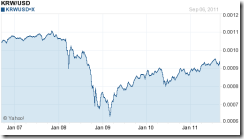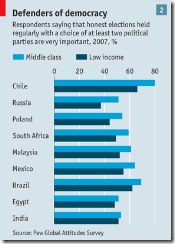Again, it’s almost too predictable that the path dependency of political authorities have been to resort to more central bank activism and to apply additional government spending on emergent signs of economic weakness.
In the US, the QE 2.0 has still been in motion despite the official program for its closure last June.
Yet, over the interim there have been modified actions which can be extrapolated to stealth QE 3.0: such as extended zero bound rates until 2013 and the reinvesting of principal payments (whose mix of asset purchases would be altered partly to induce mortgage refinancing).
This news account gives light to the potential course of action by Team Ben Bernanke after his speech last night, from Bloomberg, (bold highlights mine)
Federal Reserve Chairman Ben S. Bernanke said policy makers will discuss the tools they could use to boost the recovery at their next meeting this month and stand ready to use them if necessary.
Policy makers “are prepared to employ these tools as appropriate to promote a stronger economic recovery in the context of price stability,” Bernanke said today in Minneapolis, echoing points from his Aug. 26 remarks in Jackson Hole, Wyoming.
The Fed chief, in a speech to economists, stopped short of signaling what he believes is the central bank’s best option to aid the economy. He said in previous remarks that the Fed’s measures to bolster growth include lengthening the duration of securities in its $1.65 trillion Treasury portfolio and buying more government bonds.
Media calls this portfolio rebalancing towards the lengthening of the duration of securities held as ‘Operation Twist’ which apparently aims to lower long term interest rates in order to induce the marketplace to get exposed into more risk assets. This has been part of Bernanke’s dogma of the wonkish Financial Accelerator where
changes in interest rates engineered by the central bank affect the values of the assets and the cash flows of potential borrowers and thus their creditworthiness, which in turn affects the external finance premium that borrowers face
The constant alterations of monetary policy reveal of how the previous QEs has failed. And such experiment/s will likely be put in place ahead of another official QE. The next FOMC meeting will be on the third week of September.
Of course, Ben Bernanke sees inflation as having little risk for him to have the mettle to toy around with such experimental measures.
From Marketwatch.com
see little indication that the higher rate of inflation experienced so far this year has become ingrained in the economy
The perceived low risk inflation regime has partly been because of the way the bond markets have been structured which many ideologically biased experts use as measure for inflation, and also of the constant manipulations of the commodity markets as part of their signaling channel to manage ‘inflation expectations’. Even gold markets have been subjected to price suppression scheme according to the Wikileaks
And the barrage of QE in the headlines of late, which I read has been part of this communications management tool being employed to condition the public for the next official QE.
Of course, the last act won’t come from the Bernanke’s Federal Reserve, as President Obama has offered to join in by introducing more government spending coupled with temporary tax cuts to please the opposition (Republicans).
This from the Bloomberg,
President Barack Obama called on Congress to pass a jobs plan that would inject $447 billion into the economy through infrastructure spending, subsidies to local governments to stem teacher layoffs, and cutting in half the payroll taxes paid by workers and small-business owners.
The package is heavily geared toward tax cuts, which account for more than half the dollar value of the stimulus, and administration officials said they believe that will have the greatest appeal to Republican members of Congress.
“The question is whether, in the face of an ongoing national crisis, we can stop the political circus and actually do something to help the economy,” Obama told a joint session of Congress tonight, according to a text of the address released by the White House.
A $105 billion infrastructure proposal includes money for school modernization, transportation projects and rehabilitation of vacant properties. Most of the economic impact from the infrastructure spending would be next year though some of it would come in 2013, an administration official said.
“Ultimately, our recovery will be driven not by Washington, but by our businesses and workers,” the president said. “But we can help. We can make a difference.”
The administration estimated that $35 billion it’s seeking in direct aid to state and local governments to stem layoffs of educators and emergency personnel would save the jobs of 280,000 teachers, according to a White House fact sheet.
It has never been the question whether past policies worked. It’s just doing the same thing over and over with practically the same results which represents as plain insanity and the misplaced belief on miracles from centrally planned actions.
Economic reality will eventually unmask the charade of shifting resources from productive activities to non-productive activities that will not only lead to capital consumption but also lead to cronyism, corruption, regime uncertainty, economic and financial fragility and political instability. Obviously Obama's is desperately trying to shore up his re-election odds, whose popularity rating has fallen to new lows.
Nonetheless we will be seeing expanded stimulus from all fronts in the US and the world which means a vastly distorted financial markets. More stimulus on top of the existing ones which means increasing systemic risks from artificial boosters or substance dependency.
This also means traditional metrics in the assessment of the financial marketplace will hardly be effective.







